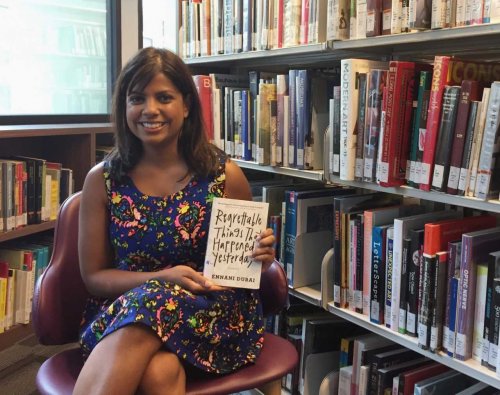By Tai Jia Xuan
Diploma in Creative Writing for Television and New Media
Singapore Polytechnic

Jennani Durai’s first fiction book, Regrettable Things that Happened Yesterday, was shortlisted for the 2018 Singapore Literature Prize. (Photo by Saraswathy D/O Kumaran)
Growing up in Singapore, it never struck Jennani Durai that there were few stories about Indian Singaporeans like her.
And even after becoming more aware of this issue, she remained sceptical about its relevance to society.
“Indians are 7 percent of Singapore, so I was like, who wants to read about 7 percent of a tiny dot on the map?” Jennani laughs.
But when she debuted her first solo book, Regrettable Things that Happened Yesterday, the 32-year-old writer and former journalist received far greater reception than she anticipated.
Shortlisted for the Singapore Literature Prize 2018, the book features mostly Indian Singaporean characters in a collection of ten short stories linked by the motif of newspapers.
Writing fiction, her passion
Having always been interested in writing fiction, Jennani began working on a few short stories while still a journalist for the Straits Times. After moving to Guatemala with her husband, she focused on finishing Regrettable Things that Happened Yesterday, publishing it with Epigram in 2017.
Her six years as a journalist honed her fiction writing skills as meeting different people and hearing their stories helped her “develop the basic tool for writers: empathy.”
Although the book’s recurring motif of newspapers started out as a coincidence, Jennani believes in the power of newspapers and is glad that they play such a huge part in her book.
Minority representation in English fiction
Besides newspapers, Jennani believes in having more Indian Singaporean stories in English fiction so that minority readers can read about themselves and feel represented here.
She recalls when she first read Sugarbread by local author Balli Kaur Jaswal and was stunned by the number of things she connected with in the book.
One part that stood out was when the main character, an 11-year-old Indian Singaporean girl, encountered a racist bus driver. Jennani had the same experience in real life and it made her wonder, “does that happen to all little Indian Singaporean girls in Singapore?”
Similar to her profound moment of connection, people have told Jennani that they empathised with her stories, having gone through them as well.
Through weaving personal experiences into her book, Jennani hopes to show that Indian Singaporean experiences are no different from other Singaporeans as “we are also just Singaporeans living our lives.”
While stressing the importance of having minorities as protagonists, Jennani also understands the challenges of writing local fiction that aspiring writers may face.
“Growing up, you are reading all about white kids,” she says. “Even people who want to be writers… become writers because of the books they have read. So, it is almost hard to start writing about people like you when you want to write about things you’ve already read.”
Her advice to young writers is to write what they want to read or see more of in Singapore literature.
“You probably already have inspiration from the things you’ve seen around you in Singapore,” Jennani says, “or what you’ve imagined Singapore to be.”
Comments
There are no comments for this entry yet.
Commenting is not available in this channel entry.